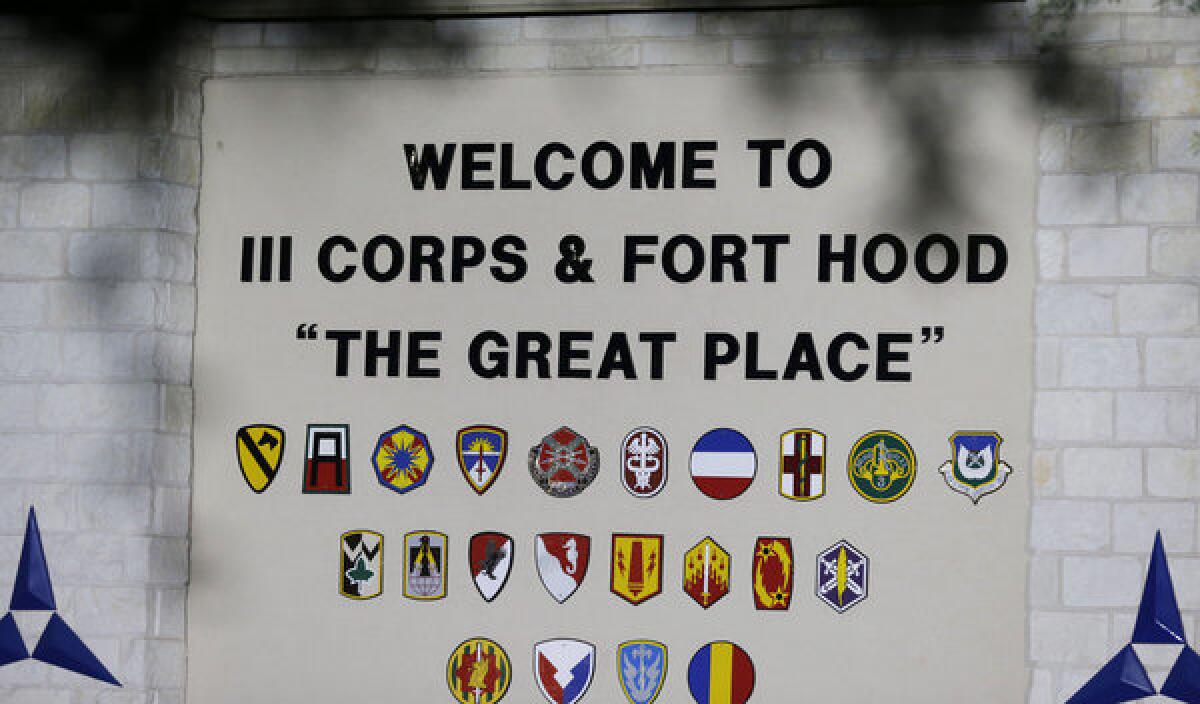Ft. Hood shooting trial: Will gunman Nidal Hasan take the stand?

- Share via
FT. HOOD, Texas -- As the Army court-martial of Maj. Nidal Malik Hasan enters its eighth day Thursday, it remains unclear whether the Ft. Hood shooter plans to testify.
Hasan, 42, is defending himself against 13 charges of premeditated murder and 32 charges of attempted premeditated murder in connection with the shooting at this central Texas base on Nov. 5, 2009.
If convicted, he could face a death sentence.
Hasan has attempted to plead guilty, but has been barred by the military judge because, under military law, guilty pleas are not allowed in capital cases.
The former Army psychiatrist, who has no legal training, rejected civilian and military lawyers and insisted on representing himself. The judge, Col. Tara Osborn, required Hasan’s military attorneys to remain as legal advisors, or “standby” counsel.
The American-born Muslim has admitted to the shooting and has attempted to defend himself on the grounds that he attacked deploying U.S. soldiers to protect Taliban leaders overseas, although the judge rejected that “defense of others” strategy.
In recent days, Hasan has released documents through a civil attorney indicating that he views a death sentence as the martyrdom that eluded him when he survived the shooting. Hasan was wounded during the attack and left paralyzed from the chest down.
“I’m paraplegic and could be in jail for the rest of my life. However, if I died by lethal injection I would still be a martyr,” Hasan told a military mental health panel a year after the shooting, according to documents Hasan released this week to the New York Times by attorney John Galligan. The panel was evaluating whether Hasan was fit to stand trial.
Hasan told them he wore earplugs to the medical processing building where the shooting occurred to dull the sound of his semiautomatic weapon, and targeted areas of the building with the “greatest density of soldiers,” according to the New York Times account of the documents, several pages from a lengthy report.
“I don’t think what I did was wrong because it was for the greater cause of helping my Muslim brothers,” Hasan reportedly told the mental health experts.
Hasan also told the panel that he had no doubts before the shooting, but was concerned about the consequences for his medical career. He said he felt no remorse -- that the attack was justified because soldiers he killed were “going against the Islamic empire.”
The documents appear to justify complaints by Hasan’s military legal advisors that he is seeking a death sentence, admitting to the shooting, largely refusing to challenge prosecutors or to cross-examine witnesses. Hasan has denied the allegations in court.
His lawyers have asked to have their role in the case modified, but the judge refused their request.
Galligan, a retired Army lawyer and judge, is based near Ft. Hood and meets regularly with Hasan at the local jail where he is being held. He has provided other documents to the media at Hasan’s request, including other pages of the mental health report, but declined to release the latest documents, saying he needed approval from Hasan.
Galligan said Hasan should have been allowed to plead guilty or to mount his own defense.
“It’s a viewpoint he’s had for a long time, and it’s been misrepresented to a certain extent by the press,” Galligan told the Los Angeles Times.
“He’s talking about protecting women and children -- the same people another soldier, Bales, killed,” he said, alluding to the court-martial of Army Staff Sgt. Robert Bales, who in June pleaded guilty in exchange for a life sentence after he was charged with murdering Afghan civilians.
Galligan said that, unlike other Army defendants, Hasan “has not received and he is not receiving a fair trial.”
“He has ineffective assistance of standby counsel. I believe they’re ‘stand down,’ ” Galligan said. “Counsel basically abandoned him.”
Galligan noted that by refusing to allow Hasan to craft his own defense strategy, the military judge “has reduced Nidal Hasan’s presence in the courtroom to little more than a prop.”
Galligan predicted that Hasan would not take the stand.
In court on Wednesday, the military judge questioned Hasan about releasing his medical documents to the media, but after Hasan said he consented to the release, the judge declined to order the full document released to the prosecution, according to a statement from Ft. Hood spokesmen.
So far, Osborn has not allowed prosecutors to enter evidence of Hasan’s Muslim extremism, such as his emails with Anwar Awlaki, an Al Qaeda-affiliated Muslim cleric, saying she would decide as the issue arose at trial.
Osborn had told the jury of 13 officers that she expected the trial to take at least a month, but it appears to be moving much faster.
Prosecutors have called scores of witnesses already, progressing from victim to expert testimony this week, including several forensic pathologists Wednesday and more expected Thursday. Prosecutors have also said they intend to submit testimony from police who traded gunfire with Hasan, ending the attack.
ALSO:
‘Obama’ rodeo stunts leads to sensitivity training for clowns
Judge rejects call to oust prosecution in Afghan massacre case
Bradley Manning apologizes for hurting people and the United States
Follow L.A. Times National on Twitter
More to Read
Sign up for Essential California
The most important California stories and recommendations in your inbox every morning.
You may occasionally receive promotional content from the Los Angeles Times.














